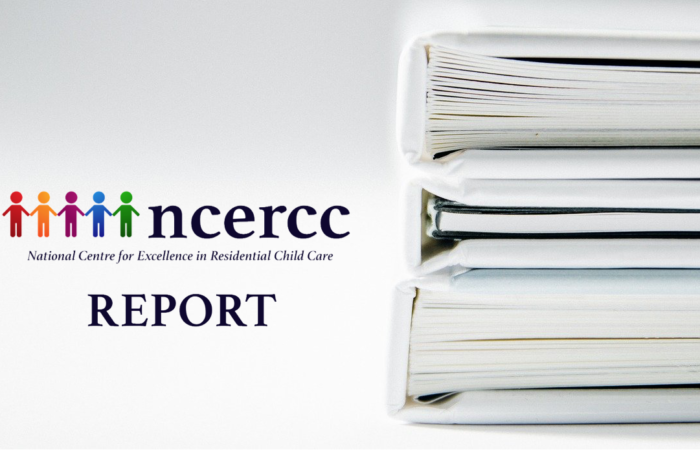
Good-enough Residential Child Care addressing the ‘ambience of unease’.
Residential Child Care is socially constructed. It exists in context of what is around it.
In the current maelstrom it is important we are all engaged in discerning the role and task of Residential Child Care today.
This task is not new. Ian Butler and Mark Drakeford addressed the subject in their 2005 chapter ‘An ambience of uneasiness’: The residential care of children, 1834–1990.
They observe that at almost every point of transition in welfare ideologies and practices (and we are at another one now) the role and task of Residential Child Care has been raised.
They make possible the important point that the policy and administrative context of Residential Child Care is to be located in the social work/care practice more generally developed. NCERCC has repeatedly forwarded that we get positive Residential Child Care as part of positive children’s services.
As the Care Review looked to relationships as core it is important to state unequivocally: Residential Child Care is an opportunity for making relationships. Relationship based children’s services are more than the Care Review proposals, as the work by Ruch and others shows. We have to go deeper and wider with the principles and practice than we have to date. We have not even started. Implementation of the Care Review is not the same as Relationship based children’s services.
If we are placing relationships at the core then we need to recover the theory and practice of Attachment, especially in relation to Residential Child Care . There is often too little in social work/care/commissioning that can be pointed to as rooted in Attachment practice. Look at length of placements, the turnover of staff, caseloads, the list is long on the ways we are not starting from first principles or from the wider deeper evidence base (there is a longer reference bank than the last few years) but from budgetary pragmatics.
Relationships and Attachment means reviewing and renewing what we take as the role and task of Residential Child Care.
Always state the obvious and here is one the wisest statements ever made about Residential Child Care: Homes which meet the personal, social, health and educational needs of children are much more likely to be safe places for children than those that do not. (Utting, W (1997) People Like Us: The report of the review of the safeguards for children living away from home. London: TSO)
Now let us go on with defining statements. It is important to state what Residential Child Care is not. It is not a last resort short-term intervention.
It is part of a series of group living settings, of which some are family based. A family is a group, this often is omitted in the thinking. To approach Residential Child Care solely as short term last resort intervention is potentially to exclude the opportunities that some child will receive from group living care. Some children benefit from group living care.
Dan Johnstone and Laura Steckley in the 2022 book Revitalizing Residential Care for Children and Youth: Cross-National Trends and Challenges (Whittaker et al) make the point of the renewed emphasis on the critical importance of relationships and rights. Their chapter has a matrix of the current policy context, key trends and initiatives, characteristics of children, preparation of Residential Child Care, promising practice, and strengths and challenges. Regular readers of NCERCC blogs will note these are all the things we do not have in England. See NCERCC blog Residential Child Care futures – we are stuck, no closer to a solution after years of reports. – NCERCC (Thanks to the numbers of people positive feedback!)
As an aside but an important one, the book could be a unique contribution to the international child welfare literature. It costs £82, placing it beyond many pockets especially ordinary low paid Residential Child Care workers. The discussion over the role and task of Residential Child Care is not for academics alone. There must be the dialogue and interplay with practitioners. (NCERCC has not been able to read the volume and we have not read any reviews or responses through the eyes of Residential Child Care workers).
There are few things to say when approaching the discussion over the role and task of Residential Child Care.
- It is always unfinished. It is important that it is so. There is more to know, and we need to be curious.
- It is always imperfect. It is important this is recognised.
- It is always in dialogue with itself and others, with its history and tradition.
- It is never fully realised but rather waits to be realised again by those creating it anew
If relationships are core to children’s care and development, we need to focus on the role and task of parenting for children looked after by others than their parents. Framing it this way opens the door to a wide field.
Residential Child Care is parenting. It’s focus as with all parenting is good-enough parenting.
‘Good enough’ parenting encompasses being sensitive, warm and empathic, physically and emotionally available to meet responsively. It also involves providing a nurturing environment where a child feels emotionally safe, contained and held. To be good enough in these ways requires an ability to be adaptive to the spontaneous experiences of your baby.
The perfect parent may find it difficult to tolerate their baby’s feelings of discomfort, frustration or anger. They try to prevent their baby from experiencing these difficult emotions. In doing so, they provide little room for their baby to express these negative feelings and instead respond pre-emptively to their child’s needs so that there is little chance of them becoming frustrated.
In contrast, the good enough parent realises that their baby needs to be responded to quickly and empathically to help protect them against becoming overwhelmed by their feelings. This provides experiences of being calmed and soothed and helps them learn to self-soothe over time and important step in learning to tolerate waiting. The good-enough parent encourages the expression of a range of feelings. They can tolerate their child’s feelings without losing themselves in those feelings. They can’t manage this all the time, but a ‘good enough’ amount of time.
The concept of good enough parenting also recognises that there is no one ‘right’ way to parent; rather, parenting can take many forms and still be good enough by providing sensitive and responsive care. It is important to recognise that the appropriate sensitivity and responsivity is from the child’s point of view not the parents. So, the degree of sensitivity and responsivity in daily care depends on the unique needs, temperament and development of your child.



